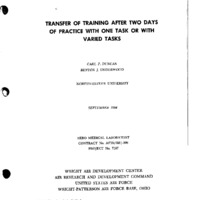-
Title
-
Transfer Training After Two Days Of Practice with One Task or with Varied Tasks
-
Date
-
1954
-
Index Abstract
-
Not Available
-
Photo Quality
-
Not Needed
-
Report Number
-
WADC TR 54-381
-
Creator
-
Duncan, C. P.
-
Underwood, B. J.
-
Corporate Author
-
Wright Air Development Center
-
Laboratory
-
Aero Medical Laboratory
-
Extent
-
18
-
PB Number
-
PB130385
-
NTRL Accession Number
-
AD054619
-
Identifier
-
AD0054619
-
Access Rights
-
Unknown
-
Distribution Classification
-
1
-
DTIC Record Exists
-
No
-
Distribution Change Authority Correspondence
-
AFAL LTR
-
Distribution Conflict
-
Fix
-
Abstract
-
Transfer among perceptual-motor paired-associate tasks was studied as a function of constant and varied training conditions. Over two days of training, one group practiced the same task on both days (constant conditions), while training was varied for the two other groups. One of these groups practiced 10 different tasks, five tasks each day; the other group practiced 10 different pairings of the stimuli and responses of the same task, five pairings each day. Following training, all groups were tested for transfer to three additional tasks. Neither method of varied training yielded transfer superior to constant training. This finding held without exception for all transfer tasks on all transfer days. A previously reported experiment had found superior initial transfer for varied training when training extended over 10 days, an interval which permitted each training task to be well mastered. In light of this, an attempt was made to account for the present results in terms of lack of mastery of each training task and the attendant lack of skill in differentiating stimuli within and between tasks. The findings of this and the previous report imply that training devices which provide a number of training task variations may yield initially greater transfer to operational equipment than training devices which provide only one training task. However, it is also implied that it is worthwile to design training task variations into training devices only if sufficient training time is available to obtain more than a small amount of mastery of each variation. Otherwsie, there may be no advantage of vaired training.
-
Report Availability
-
Full text available
-
Date Issued
-
1954-09
-
Provenance
-
Hunt Library, Embry-Riddle Aeronautical University
-
Type
-
report
-
Format
-
1 online resource
 WADCTR54-381.pdf
WADCTR54-381.pdf